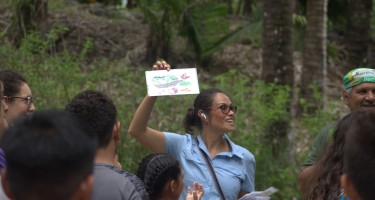Projects in Central America and the Caribbean exchange experiences and knowledge
More than 100 people from the region met at the 3rd Regional IKI Exchange Workshop, in order to strengthen connections, share experiences and find synergies to take advantage of in the future.
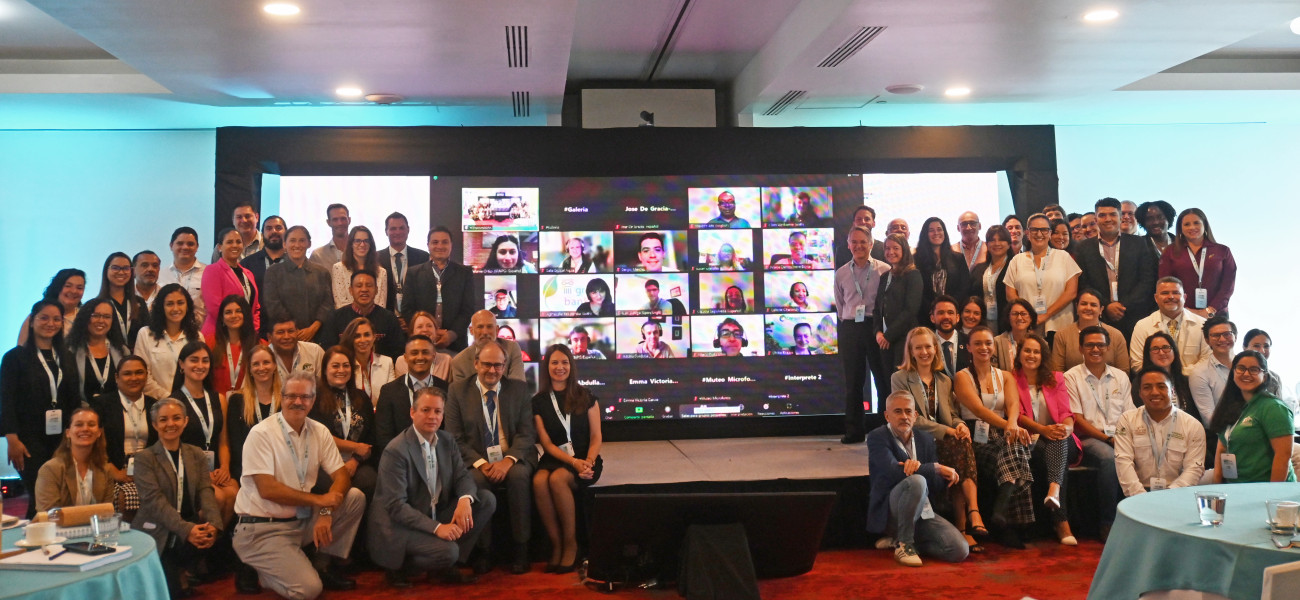
© GIZ / Dayanna Salazar. Participants during the first day of the Exchange Workshop.
For the third time, representatives of implementing organizations of IKI projects and their partners came together in a space for the exchange of knowledge and lessons learned in the implementation of their projects, during a workshop held in San José Costa Rica.
As in the previous year, a delegation from Germany participated in person, to take advantage of the important opportunity not only to directly interact with the projects but also to provide guidance on perspectives and priorities of the IKI for global climate cooperation, with a particular emphasis on Central America and the Caribbean.
“The IKI faces the double crisis of climate change and biodiversity loss in an integral way, as a financing instrument for cooperation projects aimed at the implementation of the objectives of these two conventions: climate change and biodiversity. That is why it is necessary that all actors work together: Government, academia, private sector and society ”, stated Axel Benemann, senior advisor for the German Federal Ministry of Environment, Nature Conservation, Nuclear Safety and Consumer Protection (BMUV).
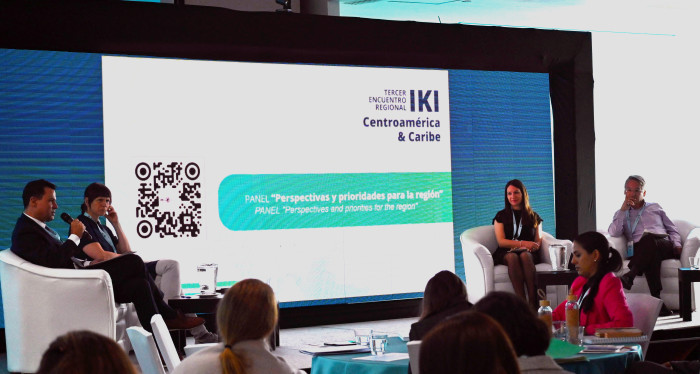
Representatives of the International Climate Initiative spoke about priorities and prospects for international cooperation in the region. © GIZ / Dayanna Salazar
The delegation highlighted how the IKI has innovated by integrating the agendas of biodiversity and climate change within its priorities.
Additionally, it emphasized that the initiative is responsive to the region's demand for fewer traditional mitigation projects and more integrated projects that also enable adaptation and benefit local communities.
Get to know some of the highlights of this workshop in the video:
News of the Interface Project
The IKI interface project for the region, implemented by the German Development Cooperation GIZ, took the opportunity to present a series of new tools for knowledge dissemination and visibility that are available to IKI projects:
- The regional platform www.iki-cac.org allows projects in the region to share their updates and serves as a repository of knowledge products of ongoing and completed projects.
- The podcast The Countdown to 2050 - scheduled to launch in late July 2023 on all major streaming platforms, will take listeners on a journey through the region to learn about the impacts that IKI funding has had.
- Through the new thematic community PANORAMA Mitigación , projects can share their successful, tangible, and replicable solutions that contribute to greenhouse gas mitigation.
"With these tools, we hope to offer new channels and means to showcase the impact that our projects have in the region, to share successful experiences and make these easily accessible to the region and beyond. We invite everyone to take advantage of them in their respective contexts," highlighted Ann-Kathrin Schloenvoigt, coordinator of the IKI Interface component at GIZ.
Additionally, the Regional Hub for Climate Innovation was presented by its coordinator, Marta Pérez de Madrid. The Hub is a platform managed by the interface project that aims to develop a coordination and facilitation mechanism for climate-impactful innovation processes at the national and regional level through knowledge management and transfer in innovation and calls for proposals.

A Speed Dating format allowed participants to create new connections with representatives from other projects and countries. © GIZ / Dayanna Salazar
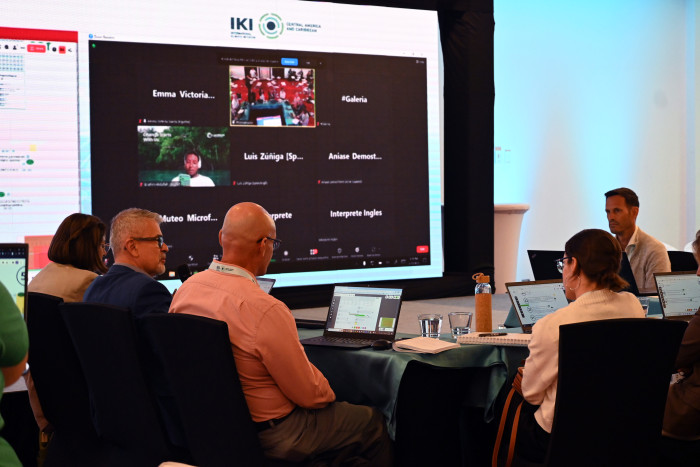
In hybrid groups, projects had the opportunity to present their main lines of action for 2023 and find synergies to explore together in the future. © GIZ / Dayanna Salazar
Technical Discussion: Exit Strategies
On the second workshop day, a space for technical discussion was offered, focusing on different topics relevant to the projects. It began with a block focused on exit strategies, in which four projects of different sizes and scopes presented their experiences in achieving a successful closure of a cooperation project.
- For Tiago Zenero, an advisor for the GIZ Local Protected Areas project in Brazil, the key lies in the energy required to develop a comprehensive and detailed closure process that involves the entire project team and requires an extended period of time to be implemented.
- Wiley Barbour, the director of the Caribbean Cooperative MRV Center project from the Greenhouse Gas Management Institute, considers it important to have faith in the counterparts and project partners, as well as in the process to be developed.
- Similarly, Lilian Márquez, an impact and monitoring advisor for the World Wildlife Fund's Coastal Readiness project, highlights co-creation as a key aspect, explaining that cooperation with partners throughout the project is essential for a successful closure.
- And for Claus Kruse, the director of the MiTransporte project from GIZ in Costa Rica, it is important to think about the exit strategy from day 1 and not leave it until the end of the project.
Group Work: Monitoring, Safeguards, and Impact Communication
In order to encourage discussion among all participants, they were divided into three groups to discuss best practices, challenges, and solutions regarding different topics. They also created recommendations and questions for IKI.
- "Leaving No One Behind: Gender Integration, Diversity, and Safeguards in IKI Projects": The importance of including vulnerable groups was discussed. Participants proposed strengthening projects through youth participation, and they highlighted the need to train projects in new risk assessment trends and tools.
- "Monitoring Projects through IKI Action Indicators and Standards": Good practices in monitoring were mentioned, such as conducting assessments to establish indicators and ensuring uniformity in processes. The group identified a challenge related to the lack of monitoring methodologies for projects, particularly for measuring standard indicators.
- "Making Impacts Visible: External Communication of Cooperation Achievements": The importance of prioritizing and planning communication was emphasized, along with evaluating the results and linking them to knowledge management. Additionally, finding ways to involve counterparts in IKI's communication efforts and projects was discussed.
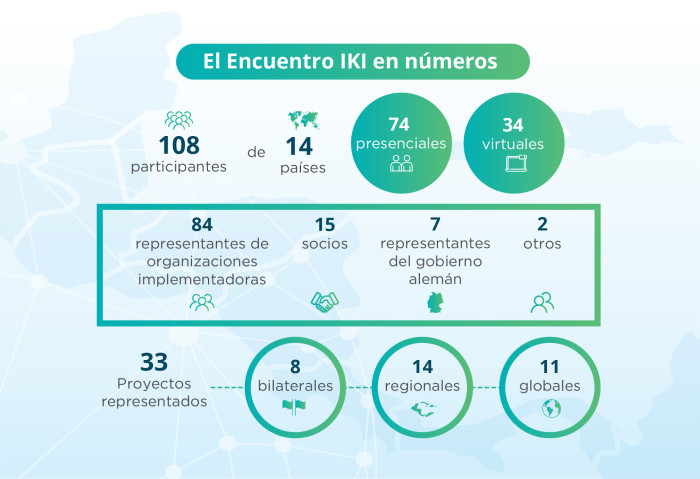
During the third workshop day, participants learned how theory has been put into practice in Costa Rica, by visiting selected IKI projects in implementation in the country. Learn all about the experience here.
The activity was organized by the German Development Cooperation GIZ as part of its ACCION Clima project, which serves as the interface project for the region. This mandate includes managing the exchange of knowledge and learnings among IKI projects.
Find more impressions of the workshop in the photo gallery:
- Country: Antigua and Barbuda, Bahamas, Barbados, Belize, Costa Rica, Cuba, Dominica, El Salvador, Grenada, Guatemala, Guyana, Haití, Honduras, Jamaica, Nicaragua, Panama, Dominican Republic, Saint Kitts and Nevis, Saint Vincent and Grenadines, Saint Lucia, Suriname, Trinidad and Tobago
- Project:
- Contact:
Ann-Kathrin Schloenvoigt
Aslhy Torres Ureña




